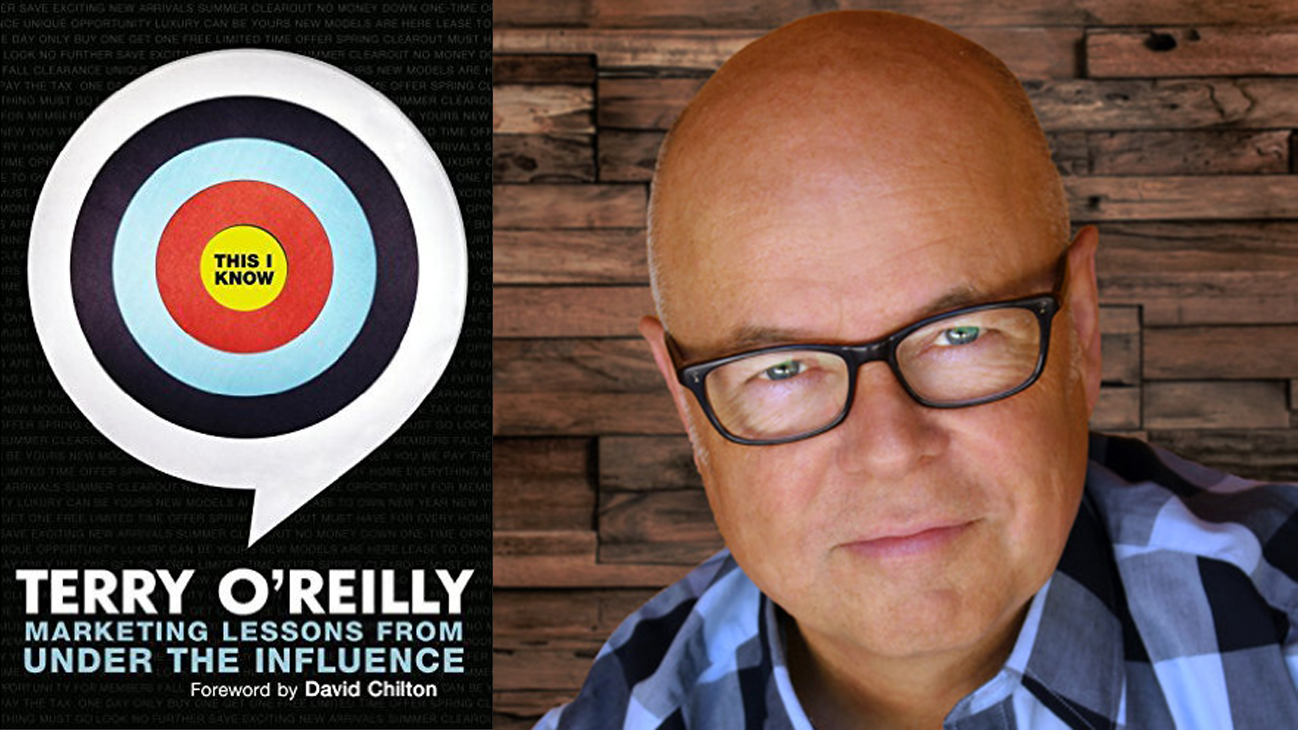Terry O’Reilly, host of CBC Radio’s Under the Influence, knows marketing from long years in the trenches, first with ad agencies then as co-founder of Pirate Radio and Television.
His book, This I Know: Marketing Lessons from Under the Influence, opens with 14 sturdy, anecdote-infused chapters covering the basics of marketing – from strategy to storytelling to nudging – in an engaging, memorable way. His final chapter, a punchy series of “This I Know” statements, crystallizes those ideas and shares his most compelling beliefs.
This, then, is some of what Terry O’Reilly knows:
- Don’t whisper a dozen things, say one thing loudly: Effective marketing messages are single minded. “If a commercial idea can’t be summed up in one line, it’s not ready to be a commercial yet,” he writes. And while he can be critical of ad agencies, here he lays the blame on clients, who overrule their agency experts, wanting “to stuff ten pounds of potatoes into a five-pound bag.” Agencies must display more backbone, insisting on single-minded messaging.
- Small brands need a big personality: A small company can’t compete with a larger company’s budget so it must take to a different battlefield, breaking through the clutter with a gutsy, vibrant approach that develops a distinctive personality.
- Radio is still powerful: It has endured the growth of movies, television, VCRs, the Internet, and social media. People listen to radio alone, intent – a human voice whispering in their ear. That’s why, if you listen to his show, you consider him a reliable friend.
- Humour is the WD-40 of advertising: Since advertising is an interruption, you need humour to open the sticky door. It makes the intrusion polite and entertaining, giving listeners a smile in return for spending the time listening. It also shows your company doesn’t take itself too seriously.
- Creativity is an amplifier: Effective advertising should be interesting, provocative and surprising rather than blunt, boring, and rude. It must evoke emotion, not just drown the audience in facts. “Creativity gets attention. Creativity amplifies the message,” he declares. But it’s not all that common. Watching TV between 8 and 11 p.m., you might see 70 commercials, with perhaps two that are good. That’s a lousy batting average, he says, and the reason ad blockers are becoming common.
- The advertising industry needs way more female creative directors: Women control 80 per cent of consumer spending, yet only three per cent of creative directors in North America are female. “If the golden marketing rule is know thy audience, why aren’t women in the driver’s seat at agencies? It makes no sense to me. It has got to change,” he says.
- People over 45 have the most money and buy the most products: The advertising industry is infatuated with the 18- to 34-year-old demographic. But boomers spend more in almost every category and, contrary to popular belief, will change brands if you make a good case.
- Advertising is an art: Marketing directors would prefer if marketing were scientific – if there was some formula and predictable results. But persuasion is an art. “Yes, there is a place for data and research and algorithms, but it still comes down to a blank page and an idea,” he says.
- Marketing rules are meant to be broken: When Dennis Hopper arrived on the set of Apocalypse Now, he told Francis Ford Coppola he intended to ad lib his lines. The legendary director replied, “You can’t change your lines until you know your lines.” The same holds true in marketing. Know the rules, and then pick the right time to break them so you can grab attention and fulfill your mandate.
- Amateurs think marketing is all about selling, but pros know it’s about differentiation: You won’t sell if you haven’t distinguished yourself from competitors.
- Marketing is a glorious puzzle: “It has a lot of pieces, but putting the big picture together has kept me happy and engaged for over 30 years,” he says.
And the book will keep you happy and engaged as you grapple with that marketing puzzle.

